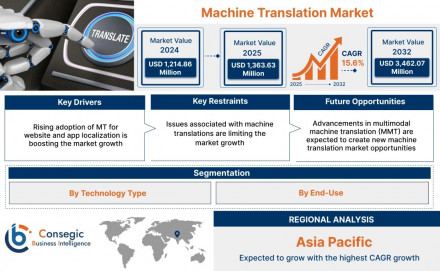Machine Translation Market Growth Factors and Industry Trends (2025-2032)

Machine Translation Market Size:
Machine Translation Market size is estimated to reach over USD 3,462.07 Million by 2032 from a value of USD 1,214.86 Million in 2024 and is projected to grow by USD 1,363.63 Million in 2025, growing at a CAGR of 15.6% from 2025 to 2032.
Machine Translation Market Introduction:
Machine Translation (MT) refers to the automated process of translating text or speech from one language to another using software and computational algorithms. MT has gained immense significance due to the rapid globalization of business, increasing cross-border communication, and the exponential growth of digital content. Initially introduced as rule-based systems, MT has evolved significantly with advancements in statistical and neural machine translation models. Today, it is a cornerstone technology in global communication strategies across industries such as e-commerce, healthcare, legal services, government, and IT.
Machine Translation Market Overview:
The machine translation market is expanding due to the growing need for multilingual content across various industries. Advancements in artificial intelligence and natural language processing are enhancing translation accuracy, while global connectivity is increasing the demand for efficient localization. Businesses find machine translation beneficial as it speeds up the process and reduces dependency on human translators. Sectors such as healthcare, technology, and defense are integrating machine translation to improve communication. Despite its advantages, challenges remain, such as handling complex language structures and cultural nuances. Companies continue to refine AI models and incorporate human oversight to ensure translation quality. Let me know if you’d like insights on specific market trends or technologies.
Machine Translation Market Includes Drivers, Restraints & Opportunities
Drivers:
- Rise in Globalization: Businesses operating in international markets require fast and accurate translation services to communicate effectively with global audiences.
- Technological Advancements: The integration of Artificial Intelligence (AI), Machine Learning (ML), and Natural Language Processing (NLP) has improved translation quality and reduced errors.
- Surge in Content Creation: The explosion of user-generated content and online publications demands scalable translation solutions.
- Cost and Time Efficiency: Machine translation offers a faster and more economical alternative to human translation, particularly for large volumes of content.
- E-commerce and Online Customer Support: The growth of global e-commerce platforms has led to increased use of MT for product descriptions, reviews, and customer support.
Restraints:
- Quality and Contextual Accuracy: MT often struggles with idiomatic expressions, cultural nuances, and domain-specific terminology, which can lead to mistranslations.
- Data Privacy and Security: Concerns about the confidentiality of sensitive information, particularly in sectors like healthcare and legal, can hinder adoption.
- Lack of Support for Low-resource Languages: Many MT systems underperform in languages with limited digital data, reducing the market's inclusivity.
- Dependence on Post-editing: Human intervention is still required to ensure the final output meets quality standards, which can limit cost savings and automation.
Opportunities:
- Emerging Markets and Languages: Expansion into underserved regions with diverse linguistic needs offers significant growth potential.
- Integration with IoT and Voice Assistants: Combining MT with smart devices and virtual assistants can open new avenues for real-time multilingual interaction.
- Education and E-learning: The rising adoption of online learning platforms in multiple languages is creating demand for efficient MT solutions.
- Healthcare and Medical Translations: As telemedicine and cross-border healthcare services grow, accurate translation of medical content becomes essential.
- AI and Deep Learning Innovations: Continued investment in AI-based MT is expected to enhance capabilities, especially in real-time and domain-specific applications.
Machine Translation Market Competitive Landscape Analysis (Key Players)
- IBM Corporation (US)
- DeepL SE (Germany)
- CSOFT International Inc. (US)
- Omniscien Technologies Inc. (Singapore)
- SDL PLC (UK)
- Babylon Software Ltd. (Israel)
- Microsoft Corporation (US)
- Honyaku Center Inc. (Japan)
- Lionbridge Technologies Inc. (US)
- Cloudwords Inc. (US)
Machine Translation Market Industry Segmentation:
By Technology Type
- Rule-based Machine Translation (RBMT)
- Statistical Machine Translation (SMT)
- Neural Machine Translation (NMT)
By End-Use
- Military & Defense
- Retail & E-commerce
- IT & Telecommunication
- Travel & Tourism
- Healthcare
- BFSI
- Others
By Region
- Asia-Pacific
- Europe
- North America
- Latin America
- Middle East & Africa
Regional Analysis of the Machine Translation Market:
- North America: Dominates the market due to high technological adoption, presence of key players, and significant investment in AI and NLP.
- Europe: Strong growth driven by multilingual requirements across EU nations and increasing demand in legal and public sector translations.
- Asia-Pacific: Expected to witness the fastest growth due to expanding internet penetration, rising e-commerce, and increased localization efforts in countries like China, India, and Japan.
- Latin America & Middle East: Growing slowly but steadily as businesses begin embracing MT to tap into global markets and cater to diverse linguistic populations.
Machine Translation Market Recent Developments:
- Advances in Neural Machine Translation: Companies like DeepL and Google have introduced significant improvements in contextual understanding and grammar through AI enhancements.
- Strategic Acquisitions: RWS's acquisition of SDL has created a stronger portfolio for enterprise translation solutions.
- Real-Time Translation Tools: Microsoft and Google have launched updates to their services, supporting voice and video translation in real-time.
- Customizable Engines: Amazon and IBM have introduced APIs allowing businesses to train MT systems on their proprietary data for higher accuracy.
- Regulatory Compliance: MT tools are increasingly being optimized for data privacy regulations like GDPR and HIPAA, especially for healthcare and legal use cases.
Contact us:
Consegic Business intelligence Pvt Ltd.
Contact no: (US) (505) 715-4344
Email: sales@consegicbusinessintelligence.com

